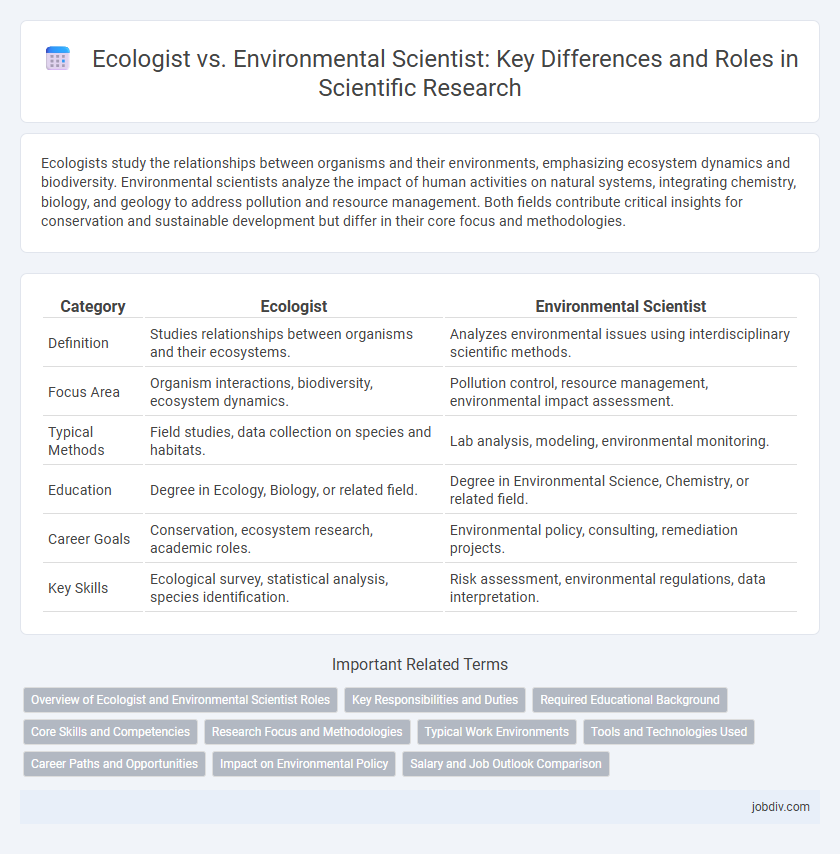Ecologists study the relationships between organisms and their environments, emphasizing ecosystem dynamics and biodiversity. Environmental scientists analyze the impact of human activities on natural systems, integrating chemistry, biology, and geology to address pollution and resource management. Both fields contribute critical insights for conservation and sustainable development but differ in their core focus and methodologies.
Table of Comparison
| Category | Ecologist | Environmental Scientist |
|---|---|---|
| Definition | Studies relationships between organisms and their ecosystems. | Analyzes environmental issues using interdisciplinary scientific methods. |
| Focus Area | Organism interactions, biodiversity, ecosystem dynamics. | Pollution control, resource management, environmental impact assessment. |
| Typical Methods | Field studies, data collection on species and habitats. | Lab analysis, modeling, environmental monitoring. |
| Education | Degree in Ecology, Biology, or related field. | Degree in Environmental Science, Chemistry, or related field. |
| Career Goals | Conservation, ecosystem research, academic roles. | Environmental policy, consulting, remediation projects. |
| Key Skills | Ecological survey, statistical analysis, species identification. | Risk assessment, environmental regulations, data interpretation. |
Overview of Ecologist and Environmental Scientist Roles
Ecologists study the relationships between organisms and their environments, focusing on ecosystems, biodiversity, and species interactions. Environmental scientists analyze environmental data to assess pollution, resource depletion, and the impacts of human activity on natural systems. Both roles contribute to environmental conservation, with ecologists emphasizing biological processes and environmental scientists integrating chemical, physical, and policy aspects.
Key Responsibilities and Duties
Ecologists study the relationships between organisms and their environments, focusing on ecosystems, biodiversity, and species interactions to understand ecological processes. Environmental scientists analyze environmental data, assess pollution levels, and develop strategies to mitigate environmental hazards and comply with regulatory standards. Both professions conduct fieldwork and data collection but differ in scope, with ecologists emphasizing biological systems and environmental scientists addressing broader environmental issues including chemical, physical, and social factors.
Required Educational Background
Ecologists typically require a bachelor's degree in ecology, biology, or environmental science, with many positions favoring advanced degrees such as a master's or PhD in ecological studies. Environmental scientists generally need at least a bachelor's degree in environmental science, chemistry, biology, or geology, with specialized certifications enhancing career prospects. Both fields emphasize strong foundations in natural sciences, but environmental scientists often integrate policy, chemistry, and earth sciences into their educational background.
Core Skills and Competencies
Ecologists specialize in understanding ecosystems, biodiversity, and species interactions, requiring strong skills in field research, data analysis, and species identification. Environmental scientists focus on assessing and mitigating environmental hazards, emphasizing competencies in chemistry, risk assessment, and regulatory knowledge. Both professions demand proficiency in GIS technology, statistical methods, and effective communication to translate scientific findings into practical solutions.
Research Focus and Methodologies
Ecologists primarily study the interactions between organisms and their environments, focusing on ecosystems, biodiversity, and species behavior using field observations, experiments, and modeling. Environmental scientists analyze the impact of human activity on natural systems, employing data collection, laboratory analysis, and geographic information systems (GIS) to assess pollution, resource management, and environmental health. Both disciplines utilize interdisciplinary research but differ in emphasis: ecologists concentrate on biological relationships, while environmental scientists focus on environmental problems and solutions.
Typical Work Environments
Ecologists typically conduct research in natural settings such as forests, wetlands, and marine environments to study organisms and ecosystems directly. Environmental scientists work in diverse environments including laboratories, offices, and field sites to analyze environmental data and develop regulatory policies. Both professions often collaborate in government agencies, universities, and environmental consulting firms to address ecological and environmental challenges.
Tools and Technologies Used
Ecologists primarily use field-based tools such as GIS mapping, remote sensing, and biodiversity sampling equipment to study ecosystems and species interactions. Environmental scientists rely on advanced laboratory technologies, including spectrometry, chromatography, and computer modeling software, to analyze pollutants and assess environmental impact. Both disciplines integrate data analytics and geographic information systems to enhance environmental monitoring and sustainable management strategies.
Career Paths and Opportunities
Ecologists primarily study the relationships between organisms and their environments, often working in research, conservation, or academia to analyze ecosystems and biodiversity. Environmental scientists focus on solving environmental problems through data collection, pollution control, and policy development, with career paths extending to government agencies, consulting firms, and industry. Both fields offer growth opportunities in sustainability, climate change mitigation, and natural resource management, but environmental science frequently presents broader interdisciplinary roles in environmental health and regulatory compliance.
Impact on Environmental Policy
Ecologists contribute to environmental policy by providing critical insights into ecosystem dynamics, biodiversity preservation, and species interactions, enabling policymakers to implement strategies that protect natural habitats. Environmental scientists expand this impact by integrating data on pollution, climate change, and resource management, offering comprehensive assessments that shape regulations and sustainability initiatives. Both disciplines influence policy through evidence-based research, but environmental scientists often address broader anthropogenic factors, making their contributions vital for holistic environmental governance.
Salary and Job Outlook Comparison
Ecologists earn an average annual salary of approximately $71,000, reflecting their specialized study of organism-environment interactions, while environmental scientists command a higher average salary near $76,000 due to broader roles involving pollution control and policy implementation. The job outlook for environmental scientists is projected to grow by 8% from 2022 to 2032, driven by increased environmental regulations and sustainability initiatives, whereas ecologist positions are expected to grow by about 5% in the same period. Both fields offer promising career opportunities, but environmental science generally provides higher compensation and slightly stronger employment growth prospects.
Ecologist vs Environmental Scientist Infographic

 jobdiv.com
jobdiv.com